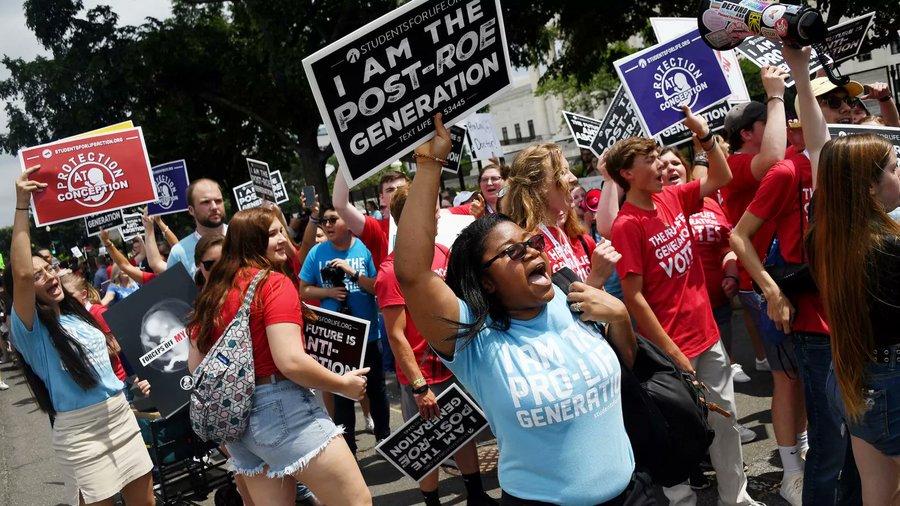I’ve waited many years for the opportunity to say that Roe v. Wade is no longer the law of the land. That day has finally come via the Dobbs Supreme Court decision last Friday that overturned Roe. We are now, thankfully, a post-Roe nation.
Wonderful as that is, it does not mean we are a post-abortion nation. What the Court did was correctly conclude that Roe was constitutionally unsound. There is no right to abortion in the Constitution—not explicitly, not even hinted at. The so-called “right” was fabricated by a Court comprised of enough justices that wanted abortion to be legal. They put their own beliefs ahead of the actual limitations in the Constitution. Therefore, the current Court has done the correct thing by overturning that earlier decision.
The Dobbs decision is being attacked by abortion advocates as some kind of blanket ban nationwide. In fact, all it does is put the decision about abortion back in the hands of state governments, which is where—constitutionally—it belongs. There is a lot of misinformation being disseminated about this, some of it from those who don’t know what they are talking about, but also from those who deliberately, for political reasons, want to mislead others.
As a historian and someone who has studied and taught the Constitution for more than thirty years, I am heartened by this reversal of Roe. But for me, this goes beyond being only a constitutional issue.
As a Christian who values the right to life of the unborn, clearly the most defenseless of all humans, I see this as a cornerstone moral issue. My mind reels over the seeming unwillingness on the other side of this debate, to grasp the ultimate reality here: when an abortion takes place, a baby is put to death. Only those with what Scripture calls a “seared conscience” can look past that obvious fact and act as if it means nothing. What does it say about a society that can do so? A lawyer I follow on social media noted that not one of the dissenting justices in Dobbs, in all their dissenting comments, even broached the subject of whether the aborted fetus is an actual living child. They don’t wish to think about it, apparently.
Now, as those of us who continue to strive for the lives of the unborn move forward, we need to do so in the proper spirit. Christians should always speak the truth in love. We cannot stop speaking the truth as we continue to argue the case state by state, but the argument must not be motivated by any kind of rage or hatred toward those on the other side of this argument.
For the last sixteen years, after moving to Florida, I’ve supported our local pro-life center. It is a ministry that reaches out to those who are considering abortion. It shows the women an ultrasound to help them understand this is a real person in the womb. It also interacts with the men who sometimes come with those women, seeking to help them comprehend the personal responsibility they have to care for the mother and child. It provides for the physical necessities—clothes, diapers, etc. It continues to work with them beyond the delivery of the baby. And as a Christian-motivated ministry, it presents a clear message of God’s love, forgiveness, and salvation.
That’s what we should be doing, and that’s what I’ve experienced in my local community. That is repeated nationwide in many communities.
Yet there is a danger out there. Some who oppose abortion don’t operate in that spirit. And it has become part of a type of politics that I want no part of. Consider, for instance, what occurred in the Texas Republican party recently. Resolutions passed with which I can be in agreement, especially on the right-to-life issue. Yet, simultaneously, that same gathering passed a resolution saying that the 2020 election was stolen. Another resolution claimed the right to secession. There is an anger fueled by politics that can overwhelm the Christian message. The worst part of it is when those who partake of that rage do so in the name of Christ.
I want nothing to do with any movement based on a lie about 2020 and that finds secession to be a viable option. There are even some in the ostensibly pro-life movement who are calling for prosecuting women who have abortions. No. Far too many who choose abortion don’t realize what they are doing and come to regret it later. Instead of prosecution, they need love, forgiveness, and compassion.
So where are we? Constitutionally, overturning Roe was essential, and I rejoice in that. What remains to be seen, however, is if those of us who represent pro-life can be the best representatives possible. We need to call out those who misrepresent the cause by their ungodly attitudes, and then we need to be, in the words of C. S. Lewis, “little Christs,” showing the world what it means to be the people of God.
May we be faithful to that calling.


